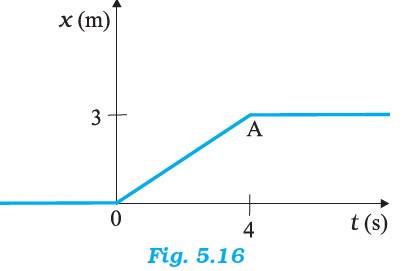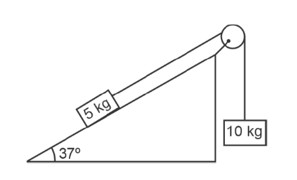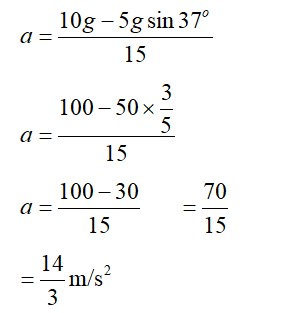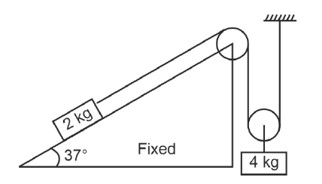5.14 Figure 5.16 shows the position-time graph of a particle of mass 4 kg. What is the
(a) Force on the particle for t < 0, t > 4 s, 0 < t < 4 s?
(b) Impulse at t = 0 and t = 4 s? (Consider one-dimensional motion only)

5.14 Figure 5.16 shows the position-time graph of a particle of mass 4 kg. What is the
(a) Force on the particle for t < 0, t > 4 s, 0 < t < 4 s?
(b) Impulse at t = 0 and t = 4 s? (Consider one-dimensional motion only)

(a) For t<0, the distance covered by the particle x is zero. Hence force on the particle is zero. For t>4s, the particle is moving at a constant distance, so the force will be zero. For 0
(b) Impulse is given by the equation, Impulse = total change of momentum. At t = 0, u = 0, v = distance / time = ¾ = 0.75 m/s
Impulse = 4 (0.75-0) kg-m/s = 3 kg-m/s
Impulse at t=4, u = 0.75, v = 0, Impulse
Similar Questions for you
= 0.92 * 1260 = 1161 m/s
For 2 kg block
T – 2g sin37 = 2a . (i)
For 4 kg block
4g – 2T =
2g – T = a . (ii)
T = (2g – a)
2g – a – 2g × = 2a
3a = 2g ×
Taking an Exam? Selecting a College?
Get authentic answers from experts, students and alumni that you won't find anywhere else.
On Shiksha, get access to
Learn more about...

physics ncert solutions class 11th 2023
View Exam DetailsMost viewed information
SummaryDidn't find the answer you were looking for?
Search from Shiksha's 1 lakh+ Topics
Ask Current Students, Alumni & our Experts
Have a question related to your career & education?
See what others like you are asking & answering






